Diplomatic Bluebook 2021
Chapter 2
Japan's Foreign Policy by Region
3 LAC Countries (See 2 (3) for CARICOM Countries)
(1) Mexico
Approximately 1,300 Japanese companies operate in Mexico, making it the biggest economic base for Japan in the LAC region. In recent years particularly, bilateral relations in the economic field have further been strengthened, driven by the Japan-Mexico Economic Partnership Agreement (Japan-Mexico EPA), which marked its 15th anniversary in 2020. Mexico, which is also a member of the TPP11 Agreement that entered into force at the end of 2018, held the third meeting of the TPP Commission (ministerial level) online as its Chair in August.
In terms of Mexico's relations with its neighboring country, the United States, the United States-Mexico-Canada Agreement (USMCA), which replaces the North American Free Trade Agreement (NAFTA), entered into force in July. On the occasion of the agreement's entry into force, President López Obrador visited Washington D.C. on his first official visit abroad since taking office and held a summit meeting with U.S. President Donald Trump. Mexico places importance on the agreement as a means to stimulate its economy, which has been stagnant due to the spread of COVID-19.
Regarding the USMCA, there are concerns about its effects on Japanese companies operating in the region, as the regional content rate for automobiles is going to be increased compared to the NAFTA rate. At the Tenth Meeting of the Joint Committee of the Japan-Mexico Economic Partnership Agreement held online in December, the Japanese side requested the Mexican side to provide sufficient information on the operation of the USMCA, in addition to requests related to the business environment faced by Japanese companies operating locally.
In addition, in January 2021, Foreign Minister Motegi visited Mexico and held meetings with Secretary of Foreign Affairs Marcelo Ebrard and Secretary of Economy Tatiana Clouthier. At the meetings, the ministers confirmed the further strengthening of strategic cooperation with Mexico, which has close relations with the U.S. where a new administration will be formed, and also affirmed cooperation with Mexico, which will be a member of the United Nations Security Council in 2021 and 2022, on various issues of the international community and the region. Minister Motegi requested the improvement and stabilization of the business environment, as well as support for Japanese companies operating in the country amidst the spread of COVID-19. The ministers also confirmed continued cooperation for the steady implementation and expansion of the TPP11 Agreement and World Trade Organization (WTO) reform.
(2) Central America (El Salvador, Guatemala, Costa Rica, Dominican Republic, Nicaragua, Panama, Belize, and Honduras)
2020 marked the 85th anniversary of the establishment of diplomatic relations between Japan and five countries of Central America. A friendship commemoration ceremony between Japan and the Central American Integration System (SICA) was held and coffees produced in each Central American country were presented as a gift to Japanese medical personnel. Ambassador on Special Mission Yamaguchi Taimei (member of the House of Representatives) attended the inauguration ceremony of the President of Guatemala in January.
In response to the enormous damage caused by the strong Hurricanes Eta and Iota to Central American countries in November, Foreign Minister Motegi issued a message of condolence, and provided assistance such as emergency relief supplies to Nicaragua, Honduras, and Guatemala, which had suffered serious damage.
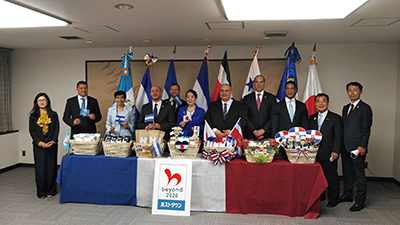 Japan and Central American Integration System (SICA) friendship commemoration ceremony (September 15, Tokyo)
Japan and Central American Integration System (SICA) friendship commemoration ceremony (September 15, Tokyo)(3) Cuba
Due to the global spread of COVID-19, Cuba's economy, including the major industry of tourism, was damaged, and the lives of the people became more difficult. On the other hand, Cuba supported various countries on COVID-19 countermeasures by dispatching about 4,000 medical personnel to about 40 countries and regions. In November, a signing ceremony was held in Havana for a memorandum of cooperation between Japan's Ministry of Health, Labor and Welfare and Cuba's Ministry of Public Health.
(4) Brazil
Since April, when COVID-19 began to spread in Brazil, President Jair Bolsonaro has been criticized by domestic and foreign media for his COVID-19 countermeasures, coupled with the political turmoil in the country. Furthermore, even though President Bolsonaro himself was infected with COVID-19 in July, he has not changed his stance of emphasizing the importance of economy since taking office. On the other hand, in April, as the COVID-19 pandemic continued worsening, Brazil's Supreme Court ruled that local governments are the ones who make the final decisions on COVID-19 countermeasures. Under this ruling, strict measures were taken in municipalities, including the compulsory closure of all facilities except for services essential for daily life.
In terms of relations with Japan, State Minister for Foreign Affairs Suzuki visited Brazil in February. Later, while the official visits of the dignitaries were restricted due to the COVID-19 pandemic, a Japan-Brazil foreign ministers' telephone call was held in October. The two ministers confirmed that Japan and Brazil would further deepen their good bilateral relations in extensive areas and cooperate in the international arena as “Strategic Global Partners” that share fundamental values and have bonds through Nikkei people (Japanese immigrants and their descendants). Furthermore, the first Japan-U.S.-Brazil Exchange (JUSBE) was held in-person in Brasilia in November, and it was confirmed that the countries will continuously pursue specific cooperative relations based on shared values such as freedom, democracy and the rule of law. In January 2021, Foreign Minister Motegi visited Brazil and reaffirmed the shared fundamental values such as democracy, as well as the traditional bonds of Nikkei people, with the Bolsonaro administration promoting new diplomacy that emphasizes the importance of the cooperation with the U.S. and Japan. Foreign Minister Motegi also confirmed the further strengthening of strategic cooperation to maintain and strengthen the free and open international order, including the use of JUSBE, and agreed to further deepen bilateral cooperative relations in a wide range of areas, including the economy, environment, and people-to-people exchanges.
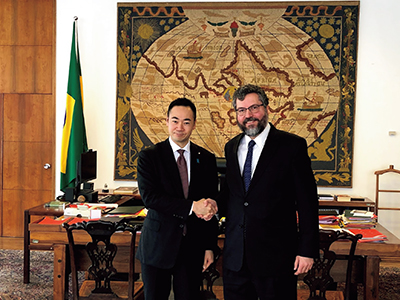 State Minister for Foreign Affairs Suzuki meeting with Foreign Minister Araujo of Brazil (February 14, Brasilia, Brazil)
State Minister for Foreign Affairs Suzuki meeting with Foreign Minister Araujo of Brazil (February 14, Brasilia, Brazil)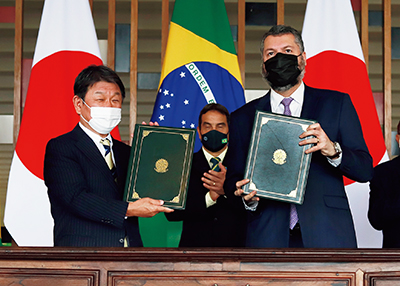 Signing ceremony for the “Memorandum of Cooperation in the field of technologies related to the Production and Use of Niobium and Graphene” and the “Tomé-Açu Memorandum of Cooperation on the Sustainable Use of the Biodiversity of the Amazon” during the visit to Brazil by Foreign Minister Motegi (January 8, 2021, Brasilia, Brazil)
Signing ceremony for the “Memorandum of Cooperation in the field of technologies related to the Production and Use of Niobium and Graphene” and the “Tomé-Açu Memorandum of Cooperation on the Sustainable Use of the Biodiversity of the Amazon” during the visit to Brazil by Foreign Minister Motegi (January 8, 2021, Brasilia, Brazil)2020 marked the 125th anniversary of the conclusion of the Treaty of Commerce and Navigation between Japan and Brazil. The two countries have a history of mutual cooperation in the area of migration, particularly in their mutual welcome of migrants from Japan and migrants from Brazil. Japanese migrants in Brazil have preserved the traditions of Japanese culture, and built up a heritage of honor, dedication, and integrity.
The Nikkei (Japanese immigrants and their descendants) community was formed across the whole of Brazil, and various Japan-related associations exist for the purpose of passing on the Japanese culture to future generations in Brazil. The Brazilian national anthem as well as the Japanese national anthem, “Kimi Ga Yo,” are played at the start of traditional events organized by such associations, such as events on Japanese culture and Japanese cuisine. When the Nikkei people hear these anthems, they feel deeply moved.
The Nikkei people feel a sense of pride and gratitude toward their forefathers, and I believe this is what drives thousands of Nikkei people to volunteer in the activities of the Nikkei community, so that they can pass on the heritage built by the Japanese migrants to future generations.
Japanese culture lives on in the state of Goias through the efforts of the Japanese-Brazilian Association of Goias (ANBG), and the Nikkei people remain united. ANBG offers a variety of enjoyable courses on a nonprofit basis, including Japanese language classes, arts such as ikebana, origami, kendo, and taiko, and sports such as gateball, soccer, volleyball, table-tennis, and tennis. The community here has continued to engage actively in activities through groups for women, the elderly, students, and youths, and members collaborate to organize cultural and food events with the aim of promoting Japanese culture in Goias. Among these, the activities by the groups of young people are worthy of special mention, and their continued involvement in ANBG's activities bring hope for the sustained efforts by ANBG into the future.
In addition to the Goias Japanese Language Model School, ANBG is also planning to establish the Goias Social Integration and Japanese Culture Research Center that includes a library and resource center on Japanese migration. Through these initiatives, it aims to encourage the Brazilian people to become better acquainted with Japanese culture, and to ensure that it is passed on and spread across Brazil.
ANBG is also engaged in activities related to sports exchanges and exchanges among young people. For example, it launched the “Ganbatte! Seinen!” (to cheer up the youth) project in 2019. Its first guest was Mr. Yamada Akira, Ambassador of Japan to Brazil, who also has guardianship over the project. 10 editions of the project have been held to date. Through dialogues with guest lecturers from the Nikkei community across the whole of Brazil, it is evoking pride among youths in their identity as Nikkei.
Worthy of special mention is the “Juntos!! Japan-Latin America and the Caribbean Exchange Program,” an important initiative promoted by the Ministry of Foreign Affairs of Japan in which participants are invited to visit Japan with the aim of strengthening the Nikkei community, as well as the cooperation of diplomats at the Embassy of Japan in Brazil who are constantly striving to strengthen Nikkei associations and support the causes of the Nikkei community. I, too, participated in the abovementioned invitational program in 2019, and the experience was both beneficial and motivating.
 Bon Odori dance event organized by ANBG (2019)
Bon Odori dance event organized by ANBG (2019)Through the increasing involvement of the younger generation, I hope that initiatives by the Nikkei community will continue to produce positive results, that the traditions of Japan will be passed on, and that the history of our forefathers will not be forgotten.
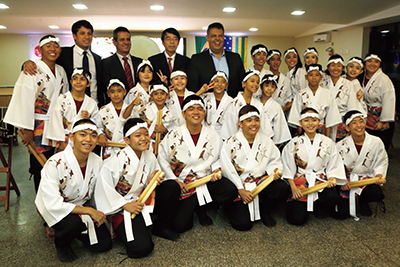 ANBG's Japanese drum (taiko) group (the author is in the back row, second from left) (2019)
ANBG's Japanese drum (taiko) group (the author is in the back row, second from left) (2019)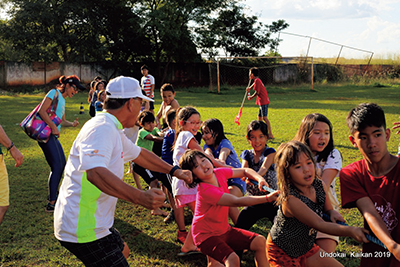 Sports meet organized by ANBG (2019)
Sports meet organized by ANBG (2019)(5) Argentina
The Alberto Fernández administration, which was inaugurated in December 2019, criticized the previous administration as being too liberal. As Argentina faces the spread of COVID-19, the administration has been implementing measures advocating dialogue with all sectors in the country, equitable development, and protection of the vulnerable population. On the economic front, the restructuring of private debt has become essential. As a result of consultations with creditors led by Minister of Economy Martin Guzmán, debt restructuring agreements were reached with almost all creditors in August, and negotiations on sovereign debt restructuring with the International Monetary Fund (IMF) and other institutions will be an important issue going forward. Argentina's economy continues to face a difficult situation, and attention is focused on the economic policies of the current administration.
In terms of relations with Japan, Japan and Argentina held a policy dialogue online in December and agreed on matters including continuing to strengthen bilateral cooperation. In January 2021, Foreign Minister Motegi visited Argentina and held the first Japan-Argentina Foreign Ministers' Meeting since the inauguration of the Fernández administration. During Minister Motegi's visit, Japan and Argentina, as “Strategic Partners” that share fundamental values, confirmed, that the two countries will maintain and strengthen the free and open international order and further strengthen cooperation on international matters such as COVID-19 countermeasures and WTO reform. The two ministers also confirmed that they would further strengthen bilateral relations in various areas including the economy, such as improving the business environment for Japanese companies operating in Argentina. Japan and Argentina also confirmed the further strengthening of cooperation with the Nikkei community, which serves as a “bridge” connecting the two countries.
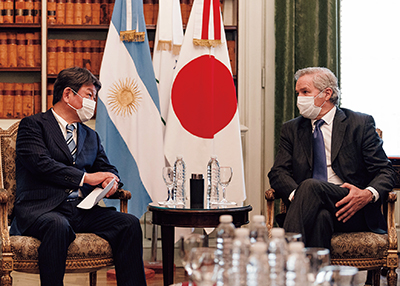 Japan-Argentina Foreign Ministers' Meeting (January 7, 2021, Buenos Aires, Argentina)
Japan-Argentina Foreign Ministers' Meeting (January 7, 2021, Buenos Aires, Argentina)(6) Peru
President Martín Vizcarra, who was inaugurated in 2018, dissolved Congress in September 2019 in a context of conflict, and an election for the members of Congress was held in January 2020. Despite his focus on COVID-19 countermeasures, his relationship with Congress did not improve and he was removed from office in November due to corruption allegations. Following this, Congress President Manuel Merino was inaugurated as President in accordance with the Peruvian Constitution, but resigned just five days later. Afterwards, Francisco Sagasti was elected as Congress President and inaugurated as the new President of Peru. A presidential election is scheduled to be held in April 2021.
In terms of relations with Japan, a Japan-Peru Summit telephone call was held in May, a foreign ministers' telephone call was held in October, and the second policy dialogue was held online in December. On these occasions, it was agreed that Japan and Peru will continue to closely collaborate and cooperate in a bilateral context and the international arena.
(7) Chile
Triggered by the raising of subway fares in October 2019, anti-government activities developed into protest activities against socioeconomic hierarchies. Due to the effects of this, the APEC Economic Leaders' Meeting and APEC Ministerial Meeting, as well as the 25th session of the Conference of the Parties to the United Nations Framework Convention on Climate Change (COP25) that were scheduled to be held at the end of 2019 in Chile were cancelled. In response to public demand, a national referendum was held in October 2020 to determine whether or not to establish a new constitution and the form of the constitutional convention. Nearly 80% of the people approved the establishment of a new constitution and the adoption of a constitutional convention elected by the people. Going forward, the process of establishing the new constitution by the constitutional convention (elections are scheduled to be held on April 11, 2021) will begin.
In terms of relations with Japan, the ninth policy dialogue was held online at the end of November, and the two sides agreed to continue strengthening cooperative relations as “Strategic Partners.”
(8) Uruguay
The Lacalle Pou administration, which was inaugurated on March 1, has been highly evaluated by the public and has maintained a high approval rating, mainly because of the various measures it has been taking to combat COVID-19 since its inauguration, including the declaration of a national health emergency on March 13.
In terms of relations with Japan, House of Representatives member Kawamura Takeo attended the presidential inauguration ceremony in March as an Ambassador on Special Mission and met with President Luis Lacalle Pou. Furthermore, a director-general-level talk was held online in September. In January 2021, on the occasion of the 100th anniversary of the establishment of diplomatic relations between Japan and Uruguay, Foreign Minister Motegi made the first visit in 35 years to Uruguay as a Japanese Foreign Minister. He confirmed that Japan and Uruguay, which is a model for the establishment of democracy and a promoter of free trade, will further strengthen their strategic cooperation to maintain and strengthen the free and open international order. Foreign Minister Motegi also confirmed that Japan and Uruguay will strengthen bilateral cooperation in various areas, especially the economy, and signed the Customs Mutual Assistance Agreement (CMAA) between Japan and Uruguay.
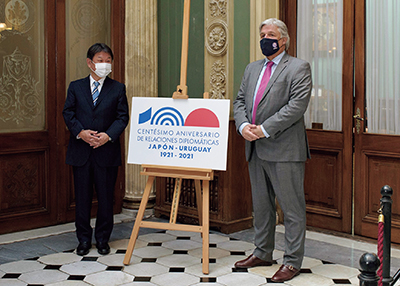 Announcement of the logo to commemorate the 100th anniversary of Japan-Uruguay diplomatic relations during Foreign Minister Motegi's visit to Uruguay (January 6, 2021, Montevideo, Uruguay)
Announcement of the logo to commemorate the 100th anniversary of Japan-Uruguay diplomatic relations during Foreign Minister Motegi's visit to Uruguay (January 6, 2021, Montevideo, Uruguay)(9) Paraguay
The Mario Abdo Benítez administration is continuing to maintain its free and open economic policies. With the centenary of diplomatic relations between Japan and Paraguay in 2019 as a stepping stone, Japan and Paraguay have maintained friendly relations even during the spread of COVID-19, and Japan has provided assistance such as support for improving water and sanitation.
Bilateral relations have steadily progressed, including the holding of the Japan-Paraguay Policy Dialogue in October. In January 2021, Foreign Minister Motegi made the first bilateral visit to Paraguay as a Japanese Foreign Minister. Japan and Paraguay, which places particular importance on fundamental values such as democracy and has traditional bonds of Nikkei people, agreed to cooperate to maintain and strengthen the free and open international order, and confirmed that they would strengthen collaboration to expand and deepen bilateral relations in diverse areas such as infrastructure, science and technology, and trade and investment. During his visit, Foreign Minister Motegi also conveyed Japan's policy of providing 9.3 billion yen in yen loans for the electric power sector.
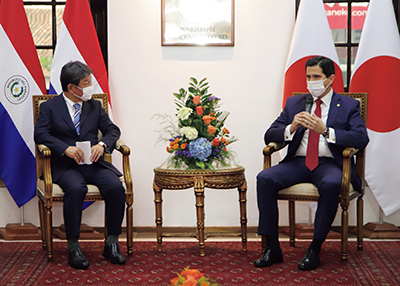 Japan-Paraguay Foreign Ministers' Meeting (January 7, 2021, Asunción, Paraguay)
Japan-Paraguay Foreign Ministers' Meeting (January 7, 2021, Asunción, Paraguay)(10) Colombia
President Iván Duque, who was inaugurated in August 2018, worked to implement the 2016 peace agreement in Colombia5 and has promoted anti-corruption measures, pension reform, and the like. In 2020, COVID-19 spread centered on large metropolises and port cities, making revitalizing the Colombian economy an urgent issue. On the diplomatic front, Colombia's official accession to the Organisation for Economic Cooperation and Development (OECD) was announced in April, and in December Colombia assumed the pro tempore presidency of the Pacific Alliance, which promotes free trade.
In terms of relations with Japan, the Fourth Policy Dialogue was held online in October, in which the two countries agreed to continue strengthening cooperative relations.
- 5 Then-President Santos started the peace talks with the Revolutionary Armed Forces of Colombia (FARC), the largest guerilla organization in Colombia, in 2012 in order to end the domestic strife that had lasted for over half a century. The peace agreement was announced in 2016.
(11) Venezuela
The inauguration ceremony for President Nicolás Maduro was held in January 2019 amidst doubts about the legitimacy of the presidential election held in May 2018. During the same month, the President of the National Assembly Juan Guaidó (opposition party) was sworn in as Interim President based on the provisions of the constitution, which intensified conflict between the administration and the opposition party. In December 2020, the election for Venezuela's National Assembly was held without participation of the main opposition parties, and Maduro's party was declared the winner. In response, people in Venezuela, including the main opposition party, as well as the international community reacted against the election, claiming that it lacked legitimacy. In addition, due to the worsening economic, social, and humanitarian situation in the country, Venezuelan nationals have been flowing into neighboring countries as refugees, and receiving them has become a regional challenge. Japan has been providing support to the Venezuelan people, including people fleeing from Venezuela, as well as to the neighboring countries affected.
(12) Bolivia
In October 2019, President Evo Morales, who had been President since 2006, declared his victory in the presidential election despite suspicions of fraud on election procedure. In November, he resigned and fled Bolivia due to protests, criticism from the international community, alienation from the military, and other factors, and the right wing administration of the pro-U.S. Interim President Jeanine Áñez was inaugurated. The election was held again in October 2020, and former Minister of Economy and Public Finance Luis Arce, a close ally of former President Morales, won. Mr. Arce was inaugurated as Bolivia's new President in November and the left-wing government was restored.
(13) Ecuador
Since March, Ecuador's economy has sustained major damage from falling oil prices and shrinking demand caused by the spread of COVID-19. However, in August, negotiations on restructuring the country's external debt were concluded, and economic reforms are progressing under the leadership of President Lenín Moreno. In terms of relations with Japan, a policy dialogue was held in Quito, capital city of Ecuador in January, and Japan and Ecuador confirmed that they would further deepen economic relations and promote cooperative relations going forward.
(14) Collaboration with Nikkei Communities
The Nikkei community has fostered a sense of affinity toward Japan in LAC countries. Nevertheless, generations have transitioned over 100 years since Japanese immigration to LAC countries began, and the younger generation with relatively little connection to Japan is growing in number. Amid this situation, in addition to inviting young Nikkei people to visit Japan, Japan also implements measures toward strengthening cooperation with Nikkei communities, including providing support for holding events by young Nikkei people in various countries and support for creating networks among young Nikkei people. Japan is also working on cooperation with Nikkei communities that transcends national borders, including the attendance by State Minister for Foreign Affairs Suzuki at the opening ceremony of the 24th Nikkei International Sports Fraternity (CONFRA) in February, and the message by State Minister for Foreign Affairs Uto for the Former MOFA trainees Association Latin America meeting, which is made of up people invited by MOFA and was held online in November.

